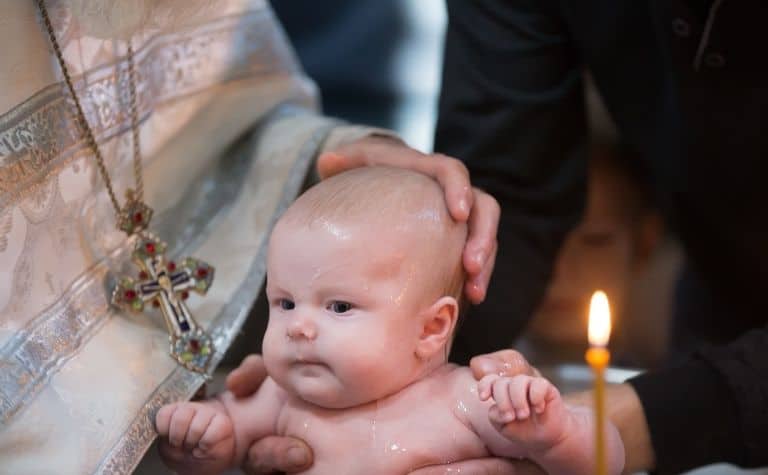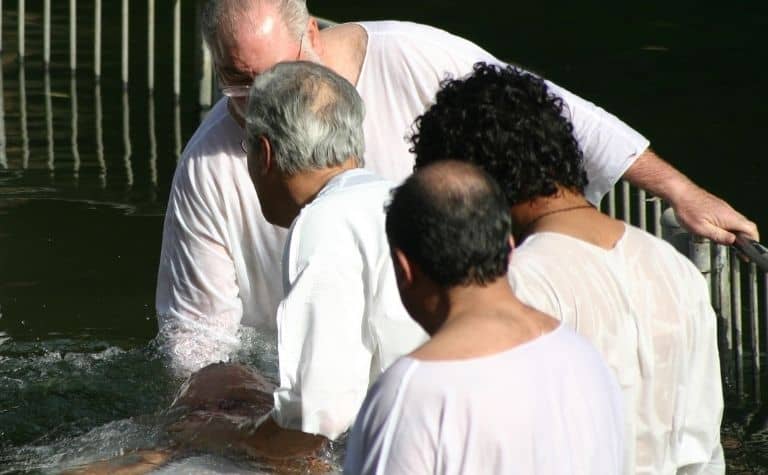The Roman Catholic church has a clearly-defined view of baptism and its theological significance. Aspects of the Catholic view on baptism differ significantly from some Protestant denominations. Understandably, a Christian might wonder if the Catholic Church recognizes baptism from Protestant denominations.
The Catholic Church considers baptism from various Protestant denominations valid, even though they disagree with the theology that undergirds them. While the baptism must meet specific requirements for a Catholic church to recognize it, the Code of Canon 845 states that baptism must not be repeated.
What exactly makes baptism valid within the Catholic Church? Do non-denominational churches typically fit these parameters? What about Protestant churches? Do they recognize Catholic baptisms? Continue reading to learn more about these important issues.
Also, see Protestant vs. Catholic vs. Orthodox: What’s the Difference? for more.

What Makes a Baptism Valid in the Catholic Church?
Two things need to be in place for a baptism to be valid in the Catholic Church:
- First, the baptism must have proper matter and form. Proper matter means the minister must use water in the baptism, not some other liquid or substance. As long as water is used, it does not matter whether the minister immerses the person or pours or sprinkles the water on the person’s head. On the other hand, proper form means that the baptizer says, “I baptize you in the name of the Father, and the Son, and the Holy Spirit.”
- Second, in a valid baptism, the minister must have proper intention. This means that both the person baptizing and the person being baptized must understand that baptism is taking place. No one can be tricked into receiving baptism. In the case of an infant or young child, the parent or caretaker must understand on behalf of the infant.
What if the person doesn’t understand what is happening or has an incorrect theology? The person baptizing does not need a complete theological understanding of what is happening in baptism. They may even have a flawed understanding of baptism.
This is important because, in most cases, a Protestant understanding of baptism is somewhat different from a Catholic understanding of baptism. This, in the Catholic mind, does not impact the baptism itself. [1]
Also, see Do All Denominations Go to Heaven?
Why can’t baptism be repeated? The reason for this is that Catholics believe baptism imprints something on the person’s character. That cannot be undone, even though people may still fall out of communion with the Catholic Church later in life.
Because the action is permanent, priests should not rebaptize Catholic converts so long as their previous baptism is valid. Baptism is effective despite the moral or theological faults of the person baptizing.
Why are investigations sometimes required? The Catholic Church must investigate a non-Catholic baptism to determine its validity. This process is easy if the church that baptized the individual keeps baptismal certificates.
This often includes all the necessary information to determine whether the baptism meets the requirements. If the particular church is one of the denominations that the church recognizes as typically performing valid baptism, then usually, no other research is needed. (Also see What Christian Denominations Don’t Take Communion?)
Certain churches require more research. As a result, the baptism of some religions is rejected. For example, the Catholic Church, as a rule, does not accept baptisms performed in the Church of Jesus Christ of Latter-Day Saints.
As a general rule, the Catholic Church believes it is better to baptize than be uncertain. If, after doing research, there is uncertainty about a particular baptism, then a priest will perform a conditional baptism.
This kind of baptism recognizes that if a valid baptism has already occurred, unknown to the priest, the second baptism will have no effect. [2] (Also see Catholic vs. Non-Denominational: What’s the Difference?)

Does the Catholic Church Recognize Non-Denominational Baptisms?
The Catholic Church recognizes many baptisms that occur in non-denominational churches. Although most non-denominational churches do not officially bind themselves to any particular creed or denomination, the theology of most generally fits well within the contours of evangelical Christianity.
Because of this, non-denominational churches consider baptism an essential part of the faith and practice of the local church. (Also see What Is a Non-Denominational Church?)
More specifically, non-denominational churches tend to be Baptistic in their understanding of baptism. This means they do not consider baptism a sacrament and only baptize professing believers, not infants. Rather, they believe baptism is a public declaration of an inward change.
Catholicism doesn’t hold to “believer’s baptism.” However, that alone does not prevent the baptism from being valid. There are other important qualifications that must be met (see above).
As long as these qualifications are met, then it doesn’t matter whether a person is baptized in a non-denominational church, a Methodist church, or a Presbyterian church. (Also see Non-Denominational vs. Evangelical: What’s the Difference?)
The Catholic Church recognizes certain Protestant denominations as typically performing valid baptisms. This is because these denominations have a consistent and valid baptismal procedure.
For example, suppose someone walks into any Presbyterian church, and a baptism happens to be taking place during the Sunday service.
In that case, the baptism will look more or less the same as it would at other Presbyterian churches throughout the world. (Also see What Christian Denominations Believe in Predestination?)

Do Protestant Churches Recognize Catholic Baptisms?
Many Protestant churches recognize Catholic baptisms. This is especially the case in the Reformed tradition, which practices infant baptism like the Catholic church.
Although Catholics and Reformed churches disagree about the exact nature of this sacrament, they both agree that baptism is, in some way, a child’s initiation into the faith community.
The child may leave this faith community when they grow older, but until then, they are a part of the church. This is why all major Reformed denominations recognize Catholic baptisms as valid. [3]
For Catholics, baptism frees a child from original sin. Lutherans do not believe this, but they do think that faith is planted in the heart of the child at baptism. (Also see Is Catholicism a Religion or a Denomination?)
However, most Baptist churches and non-denominational churches would not recognize a Catholic infant baptism because they believe that baptism is a public demonstration of the faith of a person who is able to understand the gospel. Infants and young children cannot understand the gospel and should not receive baptism.
In some Baptist churches, the pastor might also not accept a Catholic adult baptism, either because the person did not receive full immersion in water or because they do not consider that particular Catholic to have been a Christian at the time of baptism.
Also, see Largest Christian Denominations: The Top 100 to learn more.
References:
[1] Source
[2] Source
[3] Source
Related Questions
Catholic vs. Protestant vs. Orthodox: What's the Difference?
Roman Catholicism, Protestant Christianity, and the Eastern Orthodox Church are the three historical branches of the Christian religion. Each tradition traces its doctrines and practices to the New...
Baptism is one of the most important practices in Christianity. Whether baptism occurs through full immersion underwater, pouring, or sprinkling, it's a pivotal moment in a person's life. But do...
